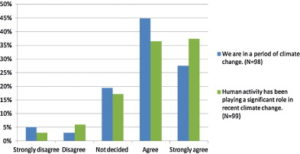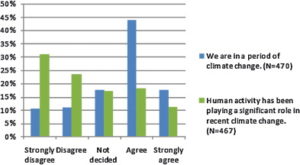Earth’s climate has changed all throughout history. Climate change as we know it has been a controversial and arguable topic and its validity has always been under investigation. The amount of research done in the U.S. over climate change in the past two decades has grown immensely (Bord et al., 1998). Studies from the research showed that back in 2009, 57% of the U.S. population believed that Global Warming was occurring where as a year later in 2010 they found that the percentage has increased to 59% (Dietz et al.). While the percentage has only grown a little, the concern is only increasing. As humans inhabiting this earth, it is natural that those aware of climate change fear it because of the possible environmental deterioration it could cause. But exactly how much of climate change are all Americans aware of and truly understand ? Research was conducted in areas less affected by the problem, several of the studies conducted involved rural American perception, specifically in rural Nevada.
The groups primarily researched included ranchers and farmers who are non-Native American and three Native American groups: Summit Lake Paiute Tribe, Pyramid Lake Paiute Tribe and the environmental managers of tribes across Nevada. Information was obtained through fieldwork with all four groups. Several methods include interviews, surveys and videos.
Amongst these groups, several of them were surveyed for their beliefs regarding climate change. There were no reflection in income but differences between political views were noted (Chief et al., 102). The Pyramid Lake tribe consists of 52% democrats, 5% republicans and 24% no interest in politics. 73% of ranchers/farmers were republicans, 4% democrats, 10% independent and 2% other and no party (Chief et al., 102). The Pyramid Lake tribe believes that,
“it impacts my life and my family’s life in ways that we cannot measure, there are changes happening faster than expected,”
whereas ranchers and farmers believe that,
“there are many local changes due to land use changes. At larger scale, there are effects from sunspots, magnetic field strengthens seafloor and terrestrial volcanism; changes in h/t of earth axis among the factors that occurring cycles that sometimes overlap and strengthen their respective effects. No one yet explained very well the difference between variation and change across a suite of scales.”
Both these groups acquire their information regarding climate change mainly from watching television. According to the collected data, the Pyramid Lake tribe and ranchers/farmers are both on the same page and approximately 45% of both groups agree that we are in a period of climate change. However, there is a drastic difference when both groups were surveyed whether or not they believe human activity played a significant role in recent climate change. A majority of the Pyramid Lake tribe either agreed or strongly agreed that recent climate change is caused by human activity but the majority of ranchers and farmers felt the opposite (Chief et al., 103).
As the data is reviewed, it shows that a greater percentage of women than men believe that climate change is happening (69% – 58%). More women than men also believe that climate change is occurring due to human activities (45% – 24%) (Chief et al., 107).
Since the 1980s, American’s awareness of “global warming” or “climate change” has grown unevenly. In 1989, 70% of Americans viewed climate change seriously and by 2003, rose to 92%. Another survey conducted in 2008 suggested that this percentage dipped to 71% and by 2010, about 57% of American adults felt climate change was happening. As we better understand the importance of climate change nationally, we are able to explore and compare the differences with tribal groups. On a personal scale, 43.5% of the Pyramid Lake tribe and ranchers/farmers felt that climate change was somewhat important to them, but on a US scale these percentages easily differ. At least half of both environmental managers and the Pyramid Lake tribe felt that climate change is a high priority, contrastingly, the majority of ranchers/farmers felt that it is from a medium priority to not a priority at all (Chief et al., 108).
Surveys show that climate change ranks third in the list of key environmental problems according to environmental managers. From 2008 to 2010, decreasing from 34% to 25% of Americans thought they were being harmed with climate change. In fact up to 23% in 2010 thought we will never be harmed by it. But, the majority of tribal members surveyed were aware of climate change and agreed that human activity plays a significant role in it. 100% of environmental managers believe that impacts of climate change are occurring right now, but just half of the Pyramid Lake tribe believe it (51%). And, only 27% of ranchers/farmers believe they are being harmed by the effects of climate change (Chief et al., 109). An opinion shared by an environmental manager stated that,
“climate change has impacted the tribe because we do not have enough water for our plants and animals. If we don’t have these resources we don’t have anything.”
A member of the Pyramid Lake tribe felt similarly,
“Less water for our lake, vegetation in areas of the reservation have dried up, aquifers have dried up. I remember waist deep snow years ago. We are lucky to get ankle deep snow these days. Springs are no longer there on the reservation, less game available and less native medicines to gather.”
Unsimilarly, a rancher/farmer had a more optimistic and specific view sharing,
“Who is to say that it would not be beneficial? Longer growing season. Maybe it would snow more…and the water table would rise. Being taxed to death to pay to correct it and give money to developing countries… is what’s going to harm my family and business.”
The truth is as surveys prove, climate change planning is undeveloped or not developed at all (Chief et al., 110).
Survey results indicate relationships with knowledge, politics and gender. A significantly large percentage of conservative, republican, male and married ranchers/farmers believe that climate change would bring little to no harmful impacts. Gender on the other hand, had significantly negative results. Female ranchers/farmers were more concerned about adverse impacts. A recent study by McCright in 2010 proved that women demonstrate more scientifically accurate information and have greater climate change knowledge, more concern about environmental issues especially including health or safety risks. Another interesting outcome of the study showed that the Pyramid Lake tribe holds a greater value on the future generations that ranchers and farmers do (Chief et al., 114).
Although the ranchers and farmers hold the most different views out of all four groups, they also hold sensible opinions. A simple one being,
“If you can’t adapt, you don’t deserve to survive, change is inevitable.”
They also worry whether or not scientific research is done right and does not turn into an excuse from the government for potentially, higher taxations. Some statements from surveyed ranchers/farmers include,
“Climate change has become an industry, self-perpetuating with very little true science and a lot of money spent and collected to control lots of people’s lives”
and,
“I worry government or congress will enact rules and regulations using climate change as an excuse to change water & natural resources laws, expand trade laws & taxes” (Chief et al., 117).
When God’s name was included in the study, two different sides were taken by Native Americans and ranchers/farmers. Tribes often refer to God’s name when honoring what God made as they pray for and protect nature, whereas for many ranchers and farmers, God was their reason not to take action because it was “arrogant” to believe that one could interfere with his plan (Chief et al., 119).
The work conducted in this study provided information and knowledge on the different perceptions of climate change from voices, sometimes, less commonly heard. Comprehension on a local level brings meaning to the public. Public opinion and risk perception regarding climate change are also increasingly important in environmental policy and management modifications. Ramifications are taking place for similar populations in arid and semi-arid lands, particularly in the Southwest of America. Global climate change has caused noticeable and observable impacts in our environment. Focusing on capacity building and collaborative research within tribes need to take place to better understand and responsibly act towards the concern of climate change (Chief et al., 117).
Works Cited
Bord, Richard J., et al. “Public Perceptions of Global Warming: United States and International Perspectives.” Endangered Species Research, 17 Dec. 1998, www.int-res.com/abstracts/cr/v11/n1/p75-84/.
Dietz, T., et al. “Scopus Preview.” Scopus Preview – Scopus – Welcome to Scopus, www.scopus.com/record/display.uri?eid=2-s2.0-34250013893&origin=inward&txGid=53c8ed1de42f1a6b1eea3dd3b23879d3.
William James Smith Jr., Zhongwei Liu, Ahmad Saleh Safi, Karletta Chief. “Climate Change
Perception, Observation and Policy Support in Rural Nevada: A Comparative Analysis of Native Americans, Non-Native Ranchers and Farmers and Mainstream America.” NeuroImage, Academic Press, 5 July 2014, www.sciencedirect.com/science/article/pii/S1462901114000641.

